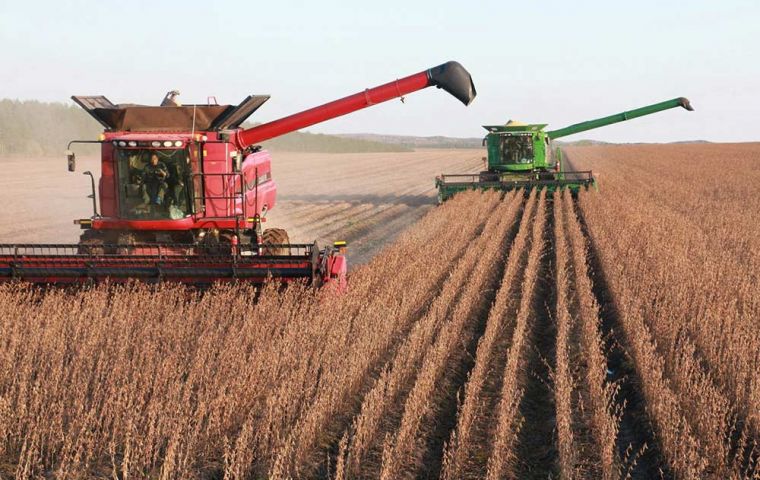MercoPress. South Atlantic News Agency
Brazil ready to take advantage of the “food inflation” despite higher production costs
 “Brazil’s soybean harvest in 2021/22 is on course to be the most expensive in history,” with prospects that the following season will be much worse
“Brazil’s soybean harvest in 2021/22 is on course to be the most expensive in history,” with prospects that the following season will be much worse Soybeans, corn, sugar, coffee, beef, pork, and chicken are the main goods in Brazil’s export portfolio, and should benefit from the current 'food inflation' in world markets until probably 2023, says analyst Elizabeth Johnson from the TS Lombardy consultancy.
“Increased production costs are a significant consequence of the Russian invasion of Ukraine,” and the rise in fertilizer costs is perhaps the factor that affects food prices the most. “Russia, it is worth saying, is one of the largest global suppliers of nitrogen, potash, and phosphate fertilizers.”
Still, despite rising nutrient prices, the prospect is for strong international demand for fertilizers.
“Brazil’s soybean harvest in 2021/22 is on course to be the most expensive in history,” adds Ms Johnson, pointing out that the following season will be much worse. For the analyst, costs should double in some areas.
However despite the price of fertilizers, Brazil is not ready to let the ”food inflation” opportunity to go unattended and has made the necessary political moves to ensure its imports from Eastern Europe increase. This despite the fact that fertilizer prices on average have risen 126% in the last twelve months.
In effect as a result imports of these inputs have grown 10% during April, compared to a year ago, and exceeding two million tons.
Felipe Serigati, an economist at the Center for Agribusiness Studies at Fundação Getúlio Vargas (FGV), explained such a growth, ”several consignees here in Brazil have anticipated their fertilizer orders. In addition, this very anticipation increased the price of fertilizers, which were already operating at high levels.”
“It is also important to point out that new transactions are still on the table. For example, there are companies, whether Belarusian or Russian, that have subsidiaries in other countries, and it is still possible to secure new transactions with these subsidiaries,” added the economist.
The provision of fertilizers to Brazil can also be understood in the international political framework since the country has been careful not to openly condemn Moscow for the invasion and according to president Jair Bolsonaro, prefers to retain a neutral position, against war, against violence.




Top Comments
Disclaimer & comment rulesCommenting for this story is now closed.
If you have a Facebook account, become a fan and comment on our Facebook Page!